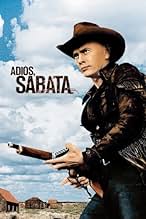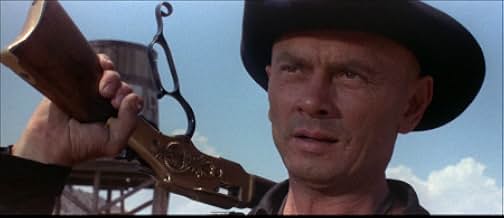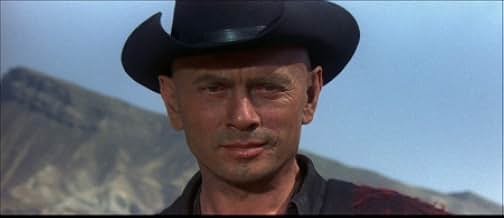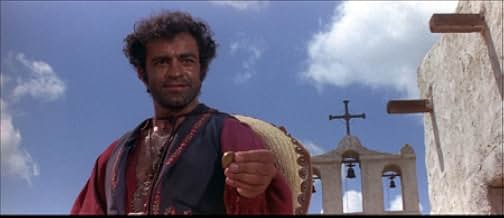VALUTAZIONE IMDb
5,9/10
2483
LA TUA VALUTAZIONE
Il maestro pistolero Sabata aiuta una banda di rivoluzionari messicani a rubare un carro d'oro.Il maestro pistolero Sabata aiuta una banda di rivoluzionari messicani a rubare un carro d'oro.Il maestro pistolero Sabata aiuta una banda di rivoluzionari messicani a rubare un carro d'oro.
- Regia
- Sceneggiatura
- Star
Ignazio Spalla
- Escudo
- (as Pedro Sanchez)
Gérard Herter
- Colonel Skimmel
- (as Gerard Herter)
Turam Quibo
- Gitano
- (as Joseph Persaud)
Nieves Navarro
- Kingsville Saloon Dancer
- (as Susan Scott)
Vittorio Caronia
- 1st Lt. Steiner
- (as Vitti Caronia)
Recensioni in evidenza
Firstly, this is *not* a sequel to 1970's "Sabata" ("Ehi amico... c'è Sabata, hai chiuso!") although it can be considered a follow up of sorts. Lee Van Cleef did not reprise the role until 1971's "Return of Sabata". "Adiós Sabata" was originally about a character called Indio Black and completely unrelated to the previous Sabata story - Indio, I believe, was meant to be nothing more than a bandit. The name was changed to cash in on the success of "Sabata" - though this film could be considered a true Sabata entry as a couple of stars return (Pedro Sanchez, Gianni Rizzo) and the screenwriters and director are the same. Gianfranco Parolini (Frank Kramer) perhaps out does the previous film here, keeping everything tighter - "Sabata" was a little too jokey (although still excellent and one of the truly great Italian westerns) whereas this is blatantly tongue in cheek. I feel the music is better in this film, never intrusive and always fitting: a triumph for Bruno Nicolai, despite the fact that it is incredibly reminiscent of Morricone.
As Sabata, Brynner is a kind of anti-hero counterpart to Chris from "The Magnificent Seven"; he even dresses out all in black here too. Gérard Herter is great as the Austrian Colonel Skimmel at the time of Emperor Maximillian's Mexico - a kind of borderline camp, Bond villain type, complete with monacle and perfectly trimmed moustache. Oh, and yes, he is a dead shot with a rifle. In "Sabata", Franco Ressel's Stengel had his shootout's behind man shaped shields (to live at the peak of danger or some such nonsense) as his playtoy; Herter's Skimmel has an even better one - a drawer beneath a model ship that when opened fires each cannon on the model directly into whoever opens the drawer. Like "The Good, the Bad and the Ugly" (which this film contains some surprisingly subtle references to) the plot centres around a shipment of gold: Sabata, Escudo (Sanchez) and Ballantine (Dean Reed) want the wagon load of gold, but it is also coveted by Maximillian's rebels. The scenes with the gold and the gold dust being poured out/spilled is nicely complimented by Nicolai's incidental music which really does bring out the joy of the characters.
I personally think it's a shame that Brynner and the others weren't brought back for another Sabata film because he plays the role much straighter than Van Cleef did and really does come across as a tough guy here, who doesn't need to rely on his gun. "Adiós Sabata" is a classic in it's own right and doesn't need to be viewed with the other Sabata entries. It's only downside is that after surpassing the superb original, it left most people disappointed with the later "Return of Sabata".
Are these subtle hints to Leone's 1966 masterpiece? Sanchez: "Me, I'd make a hiding place no-one would find - stick it in the ground, maybe in a cemetery..." Reed (the last line): "Hey fellas - are you gonna help me pick up the gold or not, you sons of...!" (music takes over)
As Sabata, Brynner is a kind of anti-hero counterpart to Chris from "The Magnificent Seven"; he even dresses out all in black here too. Gérard Herter is great as the Austrian Colonel Skimmel at the time of Emperor Maximillian's Mexico - a kind of borderline camp, Bond villain type, complete with monacle and perfectly trimmed moustache. Oh, and yes, he is a dead shot with a rifle. In "Sabata", Franco Ressel's Stengel had his shootout's behind man shaped shields (to live at the peak of danger or some such nonsense) as his playtoy; Herter's Skimmel has an even better one - a drawer beneath a model ship that when opened fires each cannon on the model directly into whoever opens the drawer. Like "The Good, the Bad and the Ugly" (which this film contains some surprisingly subtle references to) the plot centres around a shipment of gold: Sabata, Escudo (Sanchez) and Ballantine (Dean Reed) want the wagon load of gold, but it is also coveted by Maximillian's rebels. The scenes with the gold and the gold dust being poured out/spilled is nicely complimented by Nicolai's incidental music which really does bring out the joy of the characters.
I personally think it's a shame that Brynner and the others weren't brought back for another Sabata film because he plays the role much straighter than Van Cleef did and really does come across as a tough guy here, who doesn't need to rely on his gun. "Adiós Sabata" is a classic in it's own right and doesn't need to be viewed with the other Sabata entries. It's only downside is that after surpassing the superb original, it left most people disappointed with the later "Return of Sabata".
Are these subtle hints to Leone's 1966 masterpiece? Sanchez: "Me, I'd make a hiding place no-one would find - stick it in the ground, maybe in a cemetery..." Reed (the last line): "Hey fellas - are you gonna help me pick up the gold or not, you sons of...!" (music takes over)
This is not really a Sabata film, but often Italian westerns pretended to be sequels just to get unwitting customers to come to see the films*. For example, Franco Nero's "Django" was very successful so practically every Italian film producer brought out a Django film but with a different leading man--and a completely different plot! Here, cashing in on the Sabata craze (small as it was), a non-Sabata film starring Yul Brynner is suddenly a Sabata film thanks to dubbing! In fact, originally, Brynner's character was called 'Indigo Black'. I checked and there were seven Sabata films--only two which are REAL Sabata films with Lee Van Cleef. The rest, like "Adios Sabata" are just rip-offs. So is this a BAD rip-off or a decent and watchable rip-off? Read on to see...
The plot of this film is close to that of a real Sabata film in that although he looks mean and shoots people by the score, this incarnation finds him doing this in order to help the Mexican Civil War of 1867. Now that doesn't mean he won't take a percentage for himself as well! A percentage of what you may ask....GOLD. It seems an evil (but very stylish) Austrian colonel is shipping gold--gold which could be used by the revolutionaries to buy weapons. However, Sabata isn't alone in this quest--he's taking along a fat guy, two VERY strange acrobats and a pretty-boy named Ballentine--who you KNOW is up to no good.
As far as Italian westerns go, this theme is VERY common--though most of the time the hero is helping the anti-Diaz forces of the Mexican Civil War of the 1910s. This one is set much earlier and has to do with getting rid of the imposed leader, Maximillian. Regardless, this one is reasonably entertaining, full of insanely good shots and has a touch of humor. Worth seeing but not a particularly novel film...except when it comes to one of the acrobats. His skill is handling a very large ball bearing kind of like a hacky sack--which he then hurls with his foot at people with deadly accuracy! Ha...worth seeing just to see this guy in action. ball bearing guy
*The same spirit of intellectual dishonesty was also rampant in Asian films after the death of Bruce Lee. Many supposedly new and recently discovered Lee films flooded the market--starring folks such as Bruce Li or consisting of home movies of Lee or outtakes from his films interspersed with a double wearing sunglasses! These films were ALL horrible--whereas a few of the Italian knockoffs were actually watchable. Plus, at least the Italian films had cool music.
The plot of this film is close to that of a real Sabata film in that although he looks mean and shoots people by the score, this incarnation finds him doing this in order to help the Mexican Civil War of 1867. Now that doesn't mean he won't take a percentage for himself as well! A percentage of what you may ask....GOLD. It seems an evil (but very stylish) Austrian colonel is shipping gold--gold which could be used by the revolutionaries to buy weapons. However, Sabata isn't alone in this quest--he's taking along a fat guy, two VERY strange acrobats and a pretty-boy named Ballentine--who you KNOW is up to no good.
As far as Italian westerns go, this theme is VERY common--though most of the time the hero is helping the anti-Diaz forces of the Mexican Civil War of the 1910s. This one is set much earlier and has to do with getting rid of the imposed leader, Maximillian. Regardless, this one is reasonably entertaining, full of insanely good shots and has a touch of humor. Worth seeing but not a particularly novel film...except when it comes to one of the acrobats. His skill is handling a very large ball bearing kind of like a hacky sack--which he then hurls with his foot at people with deadly accuracy! Ha...worth seeing just to see this guy in action. ball bearing guy
*The same spirit of intellectual dishonesty was also rampant in Asian films after the death of Bruce Lee. Many supposedly new and recently discovered Lee films flooded the market--starring folks such as Bruce Li or consisting of home movies of Lee or outtakes from his films interspersed with a double wearing sunglasses! These films were ALL horrible--whereas a few of the Italian knockoffs were actually watchable. Plus, at least the Italian films had cool music.
The manic westerns of Gianfranco Parolini are like surreal comic books with outrageous editing and angles, bizarre weaponry, confusing language, episodic plots where every scene has a punchline, and ridiculous costumes. His films have a sense of tongue in cheek fun that comes through clearly thirty years later. It appears that the circus was his model, unpretentious entertainment pure and simple. There is absolutely no serious intention in his movies. That is why he remains the guilty pleasure of a number of fans of spaghetti westerns and eurotrash films in general. Along with Sabata (1970), Adios, Sabata is one of his "best".
The score by Bruno Nicolai is excellent, though reminiscent of Morricone's scores for the first 2 Leone movies.
The movie was originally intended be about a character called Indio Black, but with the success of Sabata the names were changed.
The five best things about this film: 1)Yul Brynner's black outfit with leather trim, an open vest, and bell bottoms 2)Lines like (spoken by Brynner), "Now let's get moving. Every Austrian in the territory will be looking for us." 3)The devious Colonel Skimmel 4)Every Austrian wears a black suit, tie, and bowler hat, making them somewhat conspicuous 5)The cast of revolutionary characters each with a unique ability or weapon
Top spaghetti western list http://imdb.com/mymovies/list?l=21849907
Average SWs http://imdb.com/mymovies/list?l=21849889
For fanatics only (bottom of the barrel) http://imdb.com/mymovies/list?l=21849890
The score by Bruno Nicolai is excellent, though reminiscent of Morricone's scores for the first 2 Leone movies.
The movie was originally intended be about a character called Indio Black, but with the success of Sabata the names were changed.
The five best things about this film: 1)Yul Brynner's black outfit with leather trim, an open vest, and bell bottoms 2)Lines like (spoken by Brynner), "Now let's get moving. Every Austrian in the territory will be looking for us." 3)The devious Colonel Skimmel 4)Every Austrian wears a black suit, tie, and bowler hat, making them somewhat conspicuous 5)The cast of revolutionary characters each with a unique ability or weapon
Top spaghetti western list http://imdb.com/mymovies/list?l=21849907
Average SWs http://imdb.com/mymovies/list?l=21849889
For fanatics only (bottom of the barrel) http://imdb.com/mymovies/list?l=21849890
Sort of sequel to the earlier Sabata with Lee Van Cleef, this was filmed as Indio Black and is known as that in several countries. The title was changed when the distributor paid for the right to use the name Sabata from the original films producer. The result is Sabata becomes a dead ringer for Chris, Yul Brynner's character from the Magnificent Seven films (a character Van Cleef was playing in a movie shot at the same time as this).
Aren't the back stage maneuvering of Spaghetti Westerns fun? Some times the stories are more fun than the movies.Fortunately this movie is more fun than the story.
The plot has Sabata (Yul Brenner) helping Mexican revolutionaries attempting to over throw the Emperor Maximilian. Sabata is to steal some gold and then use it to buy guns to attack an evil General. However things don't go as planned and when they go to steal the gold someone else is already there. Add to the whole mix spies, greed and some odd left turns and you get one entertaining, but not very coherent movie.
Don't get me wrong I like this movie a great deal, I just wish it made some sense. Characters appear out of left field when it suits the plot, people don't do anything logical (I mean if you just stole a wagon full of gold you'd make sure that the gold was really there wouldn't you?), after a certain point its never clear if they are keeping the gold or giving it to the revolution. Its enough to drive you crazy if you let it. I didn't since a good many of the spaghetti westerns I've seen make even less sense then this one.
If you like Westerns this is one to see. Its perfect for a rainy Sunday afternoon. I'm still not sure if I think of Brenner's character as Sabata, but it doesn't matter since no matter what he's called he's a kick ass hero with a smart ass mouth. What more could you want?
Aren't the back stage maneuvering of Spaghetti Westerns fun? Some times the stories are more fun than the movies.Fortunately this movie is more fun than the story.
The plot has Sabata (Yul Brenner) helping Mexican revolutionaries attempting to over throw the Emperor Maximilian. Sabata is to steal some gold and then use it to buy guns to attack an evil General. However things don't go as planned and when they go to steal the gold someone else is already there. Add to the whole mix spies, greed and some odd left turns and you get one entertaining, but not very coherent movie.
Don't get me wrong I like this movie a great deal, I just wish it made some sense. Characters appear out of left field when it suits the plot, people don't do anything logical (I mean if you just stole a wagon full of gold you'd make sure that the gold was really there wouldn't you?), after a certain point its never clear if they are keeping the gold or giving it to the revolution. Its enough to drive you crazy if you let it. I didn't since a good many of the spaghetti westerns I've seen make even less sense then this one.
If you like Westerns this is one to see. Its perfect for a rainy Sunday afternoon. I'm still not sure if I think of Brenner's character as Sabata, but it doesn't matter since no matter what he's called he's a kick ass hero with a smart ass mouth. What more could you want?
Long before the Terminator, Sabata (this time Yul Brynner in his only spaghetti western) uttered the infamous words, "I'll be back." This is the second of Gianfranco Parolini's Sabata trilogy, but it is not a sequel, as the characters and story are different. Like the first, it is also written by Renato Izzo, who went on to write the video nasty Night Train Murders after finishing the trilogy.
Brynner had the cool look that probably got him the Westworld gig a few years later.
Ignazio Spalla is back from the fist film, but with a different name (Escudo). Maybe he changed it to hide.
Sabata joins Escudo and revolutionaries trying to overthrow Austrian Archduke Maximillion, who ruled over Mexico as an imperial dictator; of course, Sabata was only after gold. Others were as well, so it was not a walk in the park.
It is fortunate that the Archduke had plenty of soldiers to sacrifice to the cause.
Well, Lee Van Cleef, Ignazio Spalla, and Aldo Canti will be back in the final Sabata film.
Brynner had the cool look that probably got him the Westworld gig a few years later.
Ignazio Spalla is back from the fist film, but with a different name (Escudo). Maybe he changed it to hide.
Sabata joins Escudo and revolutionaries trying to overthrow Austrian Archduke Maximillion, who ruled over Mexico as an imperial dictator; of course, Sabata was only after gold. Others were as well, so it was not a walk in the park.
It is fortunate that the Archduke had plenty of soldiers to sacrifice to the cause.
Well, Lee Van Cleef, Ignazio Spalla, and Aldo Canti will be back in the final Sabata film.
Lo sapevi?
- QuizThis was not originally a Sabata film. The original Italian title translates as "Indio Black, you know what? You're a big son of a...", Indio Black being the character played by Yul Brynner, but the title and Brynner's character name were changed for the American release to cash in on Ehi amico... c'è Sabata. Hai chiuso! (1969), the original Sabata film. Lee Van Cleef was asked to star in this film, but rejected the offer for some reason. He was then replaced by Brynner, whose character would only be called Sabata in the international English language version, and Indio Black in the Italian version. However, lip reading viewers have noticed that the actors who mouth their lines in English, seem to say "Sabata", not "Indio", so the re-baptism took place while the film was still being shot.
- BlooperWhen Sabata invades Colonel Skimmel's quarters, he sees the reflection of a person hiding behind the door. The person in the reflection is not Hertz.
- ConnessioniEdited into Spaghetti Western Trailer Show (2007)
I più visti
Accedi per valutare e creare un elenco di titoli salvati per ottenere consigli personalizzati
- How long is Adiós, Sabata?Powered by Alexa
- What type of weapon did Yul use in this movie?
Dettagli
Botteghino
- Lordo Stati Uniti e Canada
- 546.926 USD
- Tempo di esecuzione1 ora 44 minuti
- Proporzioni
- 2.35 : 1
Contribuisci a questa pagina
Suggerisci una modifica o aggiungi i contenuti mancanti

Divario superiore
By what name was Indio Black, sai che ti dico: Sei un gran figlio di... (1970) officially released in India in English?
Rispondi




























